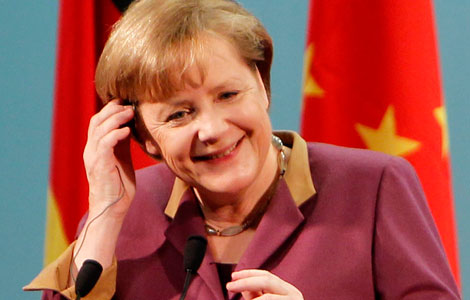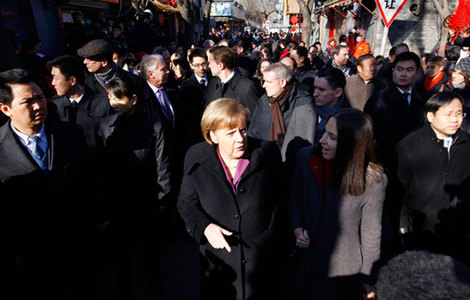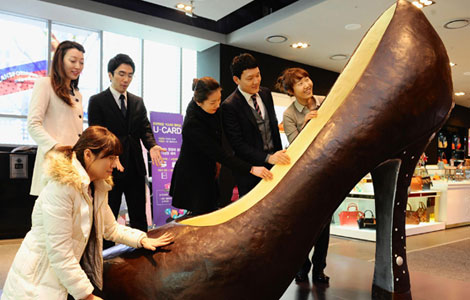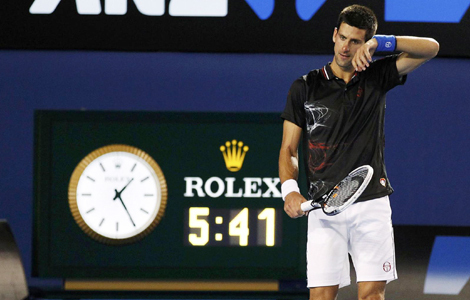Chinese bailout funding for Europe possible
Updated: 2012-02-03 07:30
By Cheng Guangjin and Zhou Wa (China Daily)
|
|||||||||
Wen also called on the Europeans to create an "objective and positive environment" and provide China with "proper investment products".
Merkel told reporters that she and Wen had reached a consensus that European countries need to further improve financial regulations.
She said that the stabilization of the euro was primarily a matter for Europeans.
"We must do our homework," she said, adding the world expected Europe to present a united front.
Zhao Junjie, an expert on European studies with the Chinese Academy of Social Sciences, said Merkel came to China to seek Beijing's support.
The European Stability Mechanism, a German-inspired pact for stricter budget discipline, has been criticized as concentrating solely on deficit-busting tactics rather than on restarting the stagnant eurozone economy.
German policy has been attacked for focusing on austerity when many EU members are struggling to create jobs.
Merkel will not simply ask China for more money, Zhao said. "She is trying to establish a comprehensive cooperation mechanism with China so that the European debt problem can be solved in a more efficient way."
Wen's choice of words indicated a slight change in China's attitude toward the debt crisis in Europe, Zhao said.
Wen's remarks suggested that China is thinking of practical and specific ways to help the EU tackle its debt problem, in addition to political support, Zhao said.
China and Germany also discussed sanctions on Iran, and Merkel told reporters that the two countries have the same goal, with different approaches: bring Iran back to the negotiation table.
The EU last week imposed a ban on the import, purchase or transport of Iranian oil, while China has long refused to support sanctions against Iran.
Merkel is on her fifth visit to China in six years as chancellor.
She will meet President Hu Jintao and top legislator Wu Bangguo on Friday before flying to the southern province of Guangdong, which is home to more than 400 German companies.
Bilateral trade reached $169 billion in 2011, an 18.9 percent increase from the previous year. Germany accounts for about one-third of China's total trade with the EU.
Merkel said the two countries' economic cooperation should be based on equal market access for two-way investment. The efforts to facilitate the investment include the improvement of intellectual property rights protection, she said.
Describing Merkel's visit as focusing on the future, Wen said he was willing to work with Merkel to advance bilateral ties.
Zhao said Berlin's China policies have become more practical and rational in recent years.
"The frequent bilateral high-ranking exchanges are positive signals. We can expect that stable Sino-German ties will push Sino-European relations to a favorable track, which will contribute to the stability of Eurasia and boost economic growth in the region," Zhao said.
To improve Sino-German ties comprehensively, Gu Junli, an expert from the Chinese Academy of Social Sciences, called for more people-to-people communication, especially among the younger generation.
"The exchange of young scholars, and the political elite is still relatively weak, but they are very important to building stable Sino-German ties", Gu said.
China Daily
Hot Topics
Kim Jong-il, Mengniu, train crash probe, Vaclav Havel, New Year, coast guard death, Internet security, Mekong River, Strait of Hormuz, economic work conference
Editor's Picks

|

|

|

|

|

|







